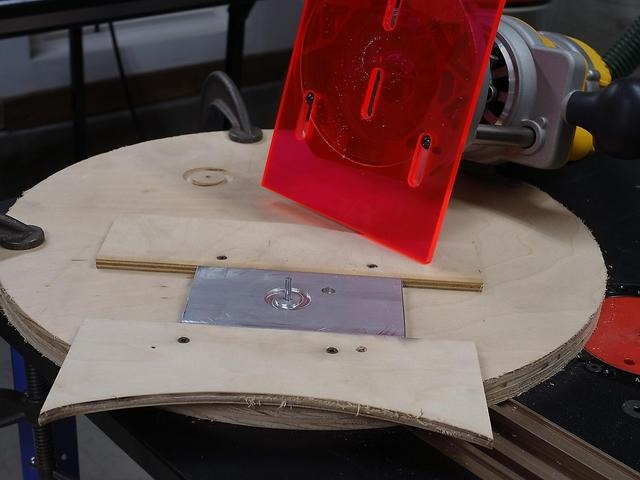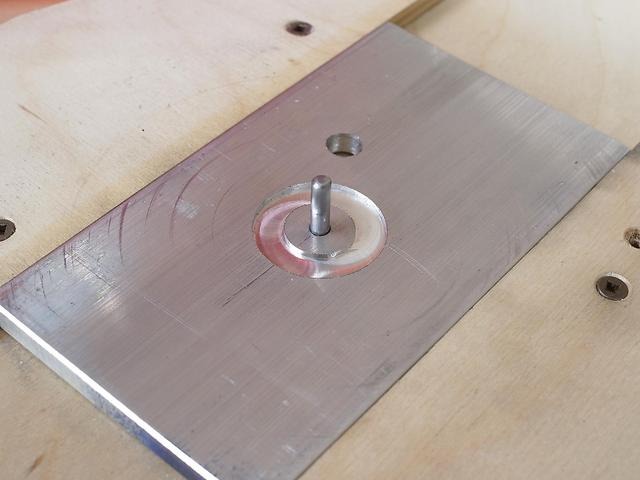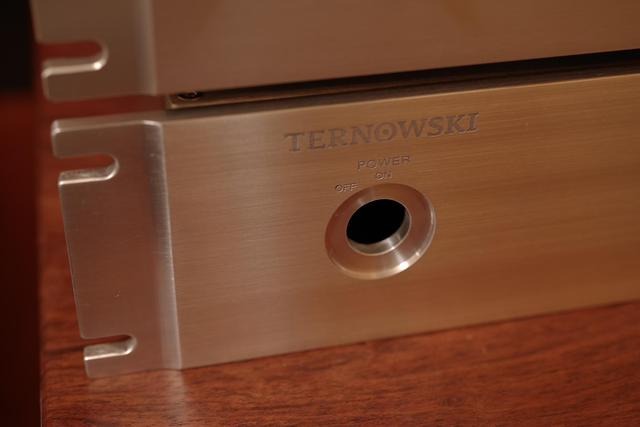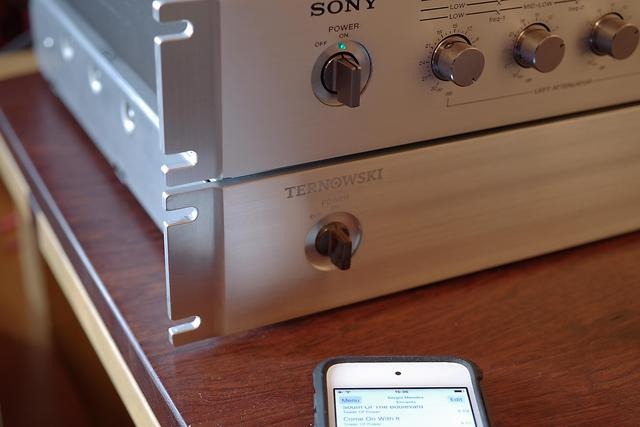I always use a stepped drill bit for aluminum, up to 15mm thick. I start with a standard bit. I have been doing it this way for a decade. I find that I get much cleaner holes that do not need extra work to clean up.
Tape the front to avoid damage.
I do not use a backing board. You don't get an blow out with a stepped bit.
Clamping is a good idea no matter what method is used.
Tape the front to avoid damage.
I do not use a backing board. You don't get an blow out with a stepped bit.
Clamping is a good idea no matter what method is used.
Last edited:
To give OP a bit of confidence, I successfully drilled a number of 19 mm diameter holes in 10 mm thick black anodized front panels using step drill and Bosch PBD 40 drill press. I also drilled a number of smaller holes (10~12 mm) and one bigger for the Neutrik connector using the same method. Just use masking tape as suggested earlier to avoid scratching the front side and drill from both sides. A pilot hole with the diameter exactly as the first step of the step drill is a must. The step drill construction also makes it easy to deburr the hole edges as you drill. I second using WD 40 as the lubricant too.
Regards,
Oleg
Regards,
Oleg
LOL to late do I see but it looks great!!
Just to anyone who may read this thread to get an answer in the future.
If you start by using a normal drill bit will you almost always see that your start hole is anything but round, often does it get a sort of triangular shape and the stepper drill bit will not be as precise as you wish.
To avoid that, can you take a thick piece of clothand fold it, and put it between the drill bit and the metal piece you want to make the hole in. You will see that the hole turns out as a perfect round hole and your stepper drill bit will have a perfect starting point.
Just to anyone who may read this thread to get an answer in the future.
If you start by using a normal drill bit will you almost always see that your start hole is anything but round, often does it get a sort of triangular shape and the stepper drill bit will not be as precise as you wish.
To avoid that, can you take a thick piece of clothand fold it, and put it between the drill bit and the metal piece you want to make the hole in. You will see that the hole turns out as a perfect round hole and your stepper drill bit will have a perfect starting point.
I see the project has already been completed successfully... it looks great, congrats!
For future reference, I would like to add my method of cutting large holes into aluminum. I have used a router with a spiral upcut bit. To some this may at first sound like a dangerous mission, but if you make a small circle jig for your router, safely mount the aluminum piece, and route in small increments (about 1/16" or 1.5mm at a time), it's a very safe and clean way to cut large holes.
For my project, I actually needed a round recess with a hole in the center. The idea was to clone the beautiful (in my opinion, anyway) front panels of the "pre-Esprit" Sony devices. Since the recess needed to be flat, a drill was not a viable choice.
Below you can see my test piece mounted, and my router with a simple small-circle jig. There is a pin screwed into the wood below the aluminum, and the aluminum piece and router jig have a hole of the same size. The aluminum piece is placed through the pin, then the router, and now the hole or recess can be cut. This jig can cut holes from about 7/8" to 2" in diameter.

The result:

I later enlarged the pin hole to the proper size to fit the power switch.
Below pictures of the finished front plate. Now if I just had the tools to clone that power switch button... I opted to make one out of wood for now.


I do like this method because it allows me to cut any arbitrary size of hole, without the need to buy the exact fitting drill.
Just sharing my methods, 'hope it helps someone.
For future reference, I would like to add my method of cutting large holes into aluminum. I have used a router with a spiral upcut bit. To some this may at first sound like a dangerous mission, but if you make a small circle jig for your router, safely mount the aluminum piece, and route in small increments (about 1/16" or 1.5mm at a time), it's a very safe and clean way to cut large holes.
For my project, I actually needed a round recess with a hole in the center. The idea was to clone the beautiful (in my opinion, anyway) front panels of the "pre-Esprit" Sony devices. Since the recess needed to be flat, a drill was not a viable choice.
Below you can see my test piece mounted, and my router with a simple small-circle jig. There is a pin screwed into the wood below the aluminum, and the aluminum piece and router jig have a hole of the same size. The aluminum piece is placed through the pin, then the router, and now the hole or recess can be cut. This jig can cut holes from about 7/8" to 2" in diameter.
The result:
I later enlarged the pin hole to the proper size to fit the power switch.
Below pictures of the finished front plate. Now if I just had the tools to clone that power switch button... I opted to make one out of wood for now.
I do like this method because it allows me to cut any arbitrary size of hole, without the need to buy the exact fitting drill.
Just sharing my methods, 'hope it helps someone.
Last edited:
I do resharpen standard drill bit to the flat (180 degrees) cutter with pilot for 19mm I'd leave pilot around 8-9mm. Also cutting angle need to be reduced to 0-5 degrees and yes cuting edge will become straight not curved. Pre-drilling 2-4mm pilot is handy. As a lube with aluminum - alcohol works the best 95% ethyl or 99% isopropyl (or methyl alcohol in well ventilated area).
example https://ak1.ostkcdn.com/images/prod...-a3dc13ee-7686-4055-bae9-22f80b1fee5d_600.jpg
Sorry not one of mine but it perfectly illustrates the idea. Largest hole I drilled this way was 25.5mm in 16mm 6061 aluminum.
example https://ak1.ostkcdn.com/images/prod...-a3dc13ee-7686-4055-bae9-22f80b1fee5d_600.jpg
Sorry not one of mine but it perfectly illustrates the idea. Largest hole I drilled this way was 25.5mm in 16mm 6061 aluminum.
I do not understand, a normal drill bit is 160 degrees, You can also buy bits to CNC that are totally straight.. What you show on the picture, looks like a drill bit, grinded down from a wood drill bit.I do resharpen standard drill bit to the flat (180 degrees) cutter with pilot for 19mm I'd leave pilot around 8-9mm. Also cutting angle need to be reduced to 0-5 degrees and yes cuting edge will become straight not curved.
Could you plwase try to tell more and the advantages of that bit?
Why spend so much money on 99%? Alcohol is the opposite of lubrication, so should have no effect while drilling.Pre-drilling 2-4mm pilot is handy. As a lube with aluminum - alcohol works the best 95% ethyl or 99% isopropyl (or methyl alcohol in well ventilated area).
Also, dependent on, if you want to clean a surface, do 70% in fact do a fare better job, then 90%+ could ever do.
example https://ak1.ostkcdn.com/images/prod...-a3dc13ee-7686-4055-bae9-22f80b1fee5d_600.jpg
Sorry not one of mine but it perfectly illustrates the idea. Largest hole I drilled this way was 25.5mm in 16mm 6061 aluminum.
Advantages are simple lees aggressive angles and cleaner cut with significantly less forces towards working piece. particularly when exiting. I suggest to try it. Advantages will become apparent immediately. It make sense to note that I do not buy these bits, I reshape and resharpen drill bits using just a regular grinder and a dremel. If that task is not up to you, then stepped bits are only option.I do not understand, a normal drill bit is 160 degrees, You can also buy bits to CNC that are totally straight.. What you show on the picture, looks like a drill bit, grinded down from a wood drill bit.
Could you plwase try to tell more and the advantages of that bit?
I'm here not for debates, just sharing my experience. It is way easier to cut aluminium when it lubricated with alcohol. For hobby usage it is quite cheap, gallon (3.8L) of 99% isopropyl is less than $10US and 99% methylhydrate is even less than that. Using 70% not justified for several reasons and it doesn't do "fare better job" as my 20+ years experience cutting aluminium for various hobby projects shows. I also routing and cutting aluminium with power tools: router (bits for wood 1/2 shank) and circular saws, table and plunge. Having water splashing around electricity powered tools not very smart idea.Why spend so much money on 99%? Alcohol is the opposite of lubrication, so should have no effect while drilling.
Also, dependent on, if you want to clean a surface, do 70% in fact do a fare better job, then 90%+ could ever do.
Using 70% is still better than using oil based products (wd40, etc)
And yes, this is "take it or leave it"
Last edited:
About drill bit: I'll try that but sins it's aluminum, how about trying to use a wood drill bit?
It may even be fun to try?
About 70% and so on: Sorry for being unclear what I meant was that 70% is best for cleaning surfaces, not for using in machines or drilling. 99% is fare to pure to be able to clean normal surfaces, as a tabletop or door handles.
I do now, clearly understand why you choose 99%, in Denmark do 95%/96% cost very little, but do not think of buying 99%!
Sorry but my reason for commenting on alcohol, not being a lubricant, was to help you!
I had no idea on your knowledge and thought you was a new-be.
You know that many noobs do think higher purity have to be better, and in my part of the world (Denmark) had you wasted a lot of money for the finally 3%-4%, you called it a lubricant and, yes it sounded as if you had got wrong information. Therefore did I try to explain that alcohol is not a lubricant, as you know is it used to remove anything that may act as a lubricant.
But now do I know that you do talk out of experience and not out of "some one on facebook told me".
But do you know why alcohol has that lubricating effect on aluminum?
It may even be fun to try?
About 70% and so on: Sorry for being unclear what I meant was that 70% is best for cleaning surfaces, not for using in machines or drilling. 99% is fare to pure to be able to clean normal surfaces, as a tabletop or door handles.
I do now, clearly understand why you choose 99%, in Denmark do 95%/96% cost very little, but do not think of buying 99%!
Sorry but my reason for commenting on alcohol, not being a lubricant, was to help you!
I had no idea on your knowledge and thought you was a new-be.
You know that many noobs do think higher purity have to be better, and in my part of the world (Denmark) had you wasted a lot of money for the finally 3%-4%, you called it a lubricant and, yes it sounded as if you had got wrong information. Therefore did I try to explain that alcohol is not a lubricant, as you know is it used to remove anything that may act as a lubricant.
But now do I know that you do talk out of experience and not out of "some one on facebook told me".
But do you know why alcohol has that lubricating effect on aluminum?
If you have a drill press and a sharp 3/4” Forster bit you can drill aluminum quite easily. I use a product called rapid tap for lubrication or even a light machine oil will do. You need to use a low speed to safely drill a hole that large. I used 19mm blue led/switch units on my F5 monoblocks. It will make you pretty nervous drilling a pristine face plate of an expensive chassis. Plan, measure, then measure again, then proceed slowly. That usually works for me.
Last edited:
Please don't particularly large diameters. Because of the central pin construction of flat wood drill bits centering is far from optimal. That's why I recommend to leave 8-9mm center pin when resharpened bit (in this case 19mm)About drill bit: I'll try that but sins it's aluminum, how about trying to use a wood drill bit?
It may even be fun to try?
You are mixing alcoholsI do now, clearly understand why you choose 99%, in Denmark do 95%/96% cost very little, but do not think of buying 99%!
Ethyl alcohol on other hand is produced cheaply only up to in 96%. 99% concentration is way more expensive and not available over the counter for consumers. Ethylhydrate a.k.a. ethyl alcohol, a.k.a drinking alcohol, is available in Canada in 95% concentration but it mixed with something to make it not drinkable and that something leaves some residue. Off course it can be used for drilling aluminium but because I also use it to wash electronics (assembled pcb), residue left by it renders it unusable so I just don't buy it because of that.
For the purpose of machining aluminium, alcohol IS a one of the best LUBRICANTS simply the best on my scale.Sorry but my reason for commenting on alcohol, not being a lubricant, was to help you!
Yes I do but I'm not going to discuss it here, mere fact that is works should be enough at least to try it and see it for yourselfBut do you know why alcohol has that lubricating effect on aluminum?
About drill bit: I'll try that but sins it's aluminum, how about trying to use a wood drill bit?
It may even be fun to try?
It certainly will
CNC is the easiest way to get a clean cut and yes, the router bits they use are like a drill bit but leveled.
garrbage First just to remove that misunderstanding, I get the idea that you think I am hostile toward your opinion? I am in no way that, what I am trying to do, is to learn and since you clearly do know a lot more about working with aluminum, why then not try to learn from you? 
I did make that mistake to think you were a noob who had got some bad advice, and I did try to help. I am asking you or how / why alcohol can work as a lubricant, since it's so far from all I have heard about alcohol: "removes any fat or lubrication", "evaporate really fast and leave nothing back or in short leaves a clean surface"
when I talked about alcohol, did I mean Isopropyl alcohol. "Clean" alcohol for drinking is is impossible to buy in Denmark, unless it has added some things to make it undrinkable, due to taste. Isopropyl or Isopropanol is normally sold as max 16.9 oz and costs from 4$-8$ for 95%, if you want 99% do you have to get it from other country's, and pay import, handling and tax, that starts by adding about 30$ or more!
Add to that shipment and the product.
I did ask you about if you know WHY it works as a lubricant, not if it do, I am in no way doubting that it does, I am trying to understand how and why?
Mario Pankov: Okay now do you also go to the extreames! There are a huge difference in trying to drill in aluminum with a pointy wood drill bit that goes up to maybe 16mm at 600 rpm and a router bit with cutting edges at 30,000 rpm!
There are a huge difference in trying to drill in aluminum with a pointy wood drill bit that goes up to maybe 16mm at 600 rpm and a router bit with cutting edges at 30,000 rpm!  You can easily use a wood band saw blade, wood table saw blade and other saw blades like that to cut in aluminum. Maybe is it possible to route but I am to scared to try that!
You can easily use a wood band saw blade, wood table saw blade and other saw blades like that to cut in aluminum. Maybe is it possible to route but I am to scared to try that! 
I did make that mistake to think you were a noob who had got some bad advice, and I did try to help. I am asking you or how / why alcohol can work as a lubricant, since it's so far from all I have heard about alcohol: "removes any fat or lubrication", "evaporate really fast and leave nothing back or in short leaves a clean surface"
when I talked about alcohol, did I mean Isopropyl alcohol. "Clean" alcohol for drinking is is impossible to buy in Denmark, unless it has added some things to make it undrinkable, due to taste. Isopropyl or Isopropanol is normally sold as max 16.9 oz and costs from 4$-8$ for 95%, if you want 99% do you have to get it from other country's, and pay import, handling and tax, that starts by adding about 30$ or more!
Add to that shipment and the product.
I did ask you about if you know WHY it works as a lubricant, not if it do, I am in no way doubting that it does, I am trying to understand how and why?
Mario Pankov: Okay now do you also go to the extreames!
Last edited:
Let put it to rest with the statement anything above or equal 95%.95%, if you want 99%
It simply doesI did ask you about if you know WHY it works as a lubricant, not if it do, I am in no way doubting that it does, I am trying to understand how and why?
I also used some other low boiling point mixes instead of isopropanol with similar results (better than any oil based) by example pcb cleaning solution (mix of 3 or 4 harbohydrates/alcohols) when it gets dirty and cannot be used anymore for pcb cleaning I save it for cutting/drilling.
I have one big disadvantage Safety as use of any alcohol based solutions is dangerous and need to be done in _very well_ ventilated area, with no spark or open flame present. Drilling is not a problem usually as solution usage is low. Circular saw cutting or routing (all my wood routers can go down to approx 10-12k rpm) are splashing like a bunch kids in a water park
Is that really relevant if it just simply worksI did ask you about if you know WHY it works as a lubricant, not if it do, I am in no way doubting that it does, I am trying to understand how and why?
- Status
- This old topic is closed. If you want to reopen this topic, contact a moderator using the "Report Post" button.
- Home
- Design & Build
- Construction Tips
- Bought a thick aluminum amp case and a 19mm powerbutton. Best way to make the hole?
